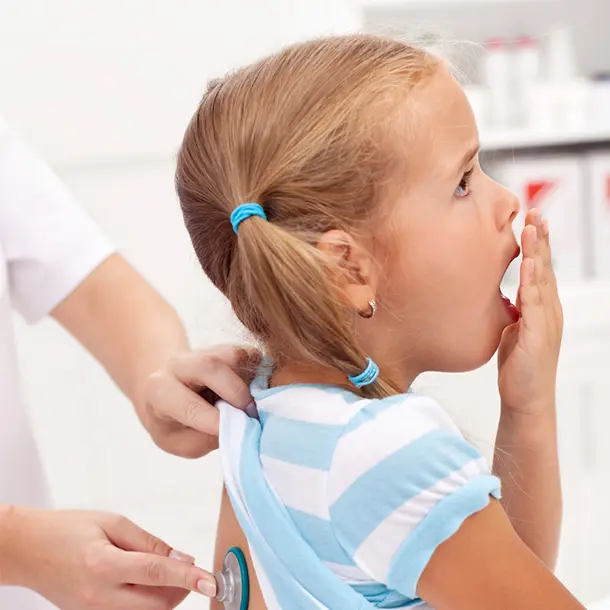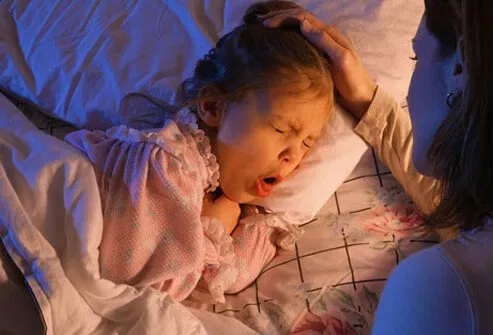- Definition
- Symptoms
- Intubation Period
- Recovery
- When to Call the Doctor
- Whooping Cough Vaccine
-
Comments
-
**COMMENTSTAGLIST**
-
More
-
**OTHERTAGLIST**

Whooping cough is considered highly contagious and is only found in humans. Coughing or sneezing spreads whooping cough from person to person. The bacteria can live in droplets that become airborne during coughing or sneezing; anyone in close contact with an individual who has whooping cough is likely to be exposed to the disease.
Even individuals who have had pertussis vaccine in the past can become infected because the vaccine, and even having the disease, does not confer lifelong protection against whooping cough. Likewise, even individuals who previously had whooping cough are not immune to future episodes of infection.
Consequently, pertussis vaccine booster shots are highly recommended and are usually incorporated with other vaccines like diphtheria and tetanus, which have a similar limited time (about five to 10 years) of protection.
What is whooping cough (pertussis)?
Whooping cough (also termed pertussis) is a respiratory disease that is caused by the bacterium Bordetella pertussis. It results in characteristic fits of coughing (the characteristic noise on inhalation produces a whooping sound) and mild to moderate difficulty with breathing (most noticeable during coughing fits). These symptoms are caused by the release of toxins produced by Bordetella pertussis bacteria that damage the lining of throat cells and cause inflammation and swelling of the throat.
What are the symptoms of whooping cough?
Early in the disease patients may have cold-like symptoms (mild cough and/or fever), but after about a week or so, severe coughing can begin.
The Stages of Whooping Cough
- Stage one: The cold-like symptoms comprise stage one of whooping cough and last about one to two weeks; stage one is termed the catarrhal stage.
- Stage two: Termed the paroxysmal stage, this stage can last from about one to six weeks and consists of fits of rapid coughing (coughing fits) and the characteristic whooping sounds.
- Stage three: Also called the convalescent stage, stage three lasts about two to three weeks with a gradual reduction of the coughing fits.
How Long Do Whooping Cough Symptoms Last?
The length of time coughing fits last is variable; for example, some individuals will still experience some coughing for as long as about three and a half months. The coughing fits can cause intermittent shortness of breath, vomiting, and fatigue.
Unfortunately, a person is usually not diagnosed with whooping cough until stage two, but the person can be contagious during stage one. Individuals with whooping cough are highly contagious during the first two weeks of stage two, but they still can be contagious for about three weeks. Some experts suggest antibiotic therapy reduces contagiousness in individuals with the disease.
Not every person who gets pertussis develops the characteristic coughing fits. If a person, especially an infant or young child, develops a persistent relatively severe cough for a week or more, a physician should be consulted to perform blood tests and cultures for Bordetella pertussis bacteria.
How is whooping cough transmitted? What is the incubation period for pertussis?
Coughing, sneezing, or direct personal contact with an infected individual easily spreads whooping cough from person to person. It is not spread to pets (dogs and cats, for example), but it can be spread to other adults and even to vaccinated individuals whose vaccine immunity has waned. It can be spread before the characteristic coughing fits begin.
The incubation period is variable, and symptoms develop usually five to 10 days after exposure to the bacteria; occasionally, the incubation period can be up to three weeks. It is possible to be contagious during the incubation period, but the highly contagious time for spread to others is in the beginning weeks of stage two (coughing fits, whooping sounds produced).
When will I know someone is cured of whooping cough?
After about three weeks of symptoms, the body usually develops an immune response that effectively limits and/or kills the bacteria. However, symptoms can still be present for some period of time (weeks to months) because of the damage done by the infection.
Early treatment with antibiotics is thought to reduce the time of contagiousness and importantly, may reduce the severity of symptoms. However, antibiotics may not help reduce any symptoms if started later (a few weeks) in the disease process.
The U.S. Centers for Disease Control and Prevention (CDC) states that giving cough medicine for pertussis usually will not help and is not recommended for children under 4 years of age; parents and/or caregivers should check with their child's pediatrician if they aren't sure what to do.
When should I call the doctor about whooping cough?
Call your child's physician or your physician or consider going to an emergency department if coughing spells cause the following:
- Pauses in breathing
- Struggling to breathe
- Face turning blue or red during coughing fits
- Vomiting during and/or after coughing fits
- Inhalation that produces a whooping sound
Is there a vaccine for whooping cough?
Perhaps the best way to avoid pertussis is to contact your child's pediatrician to make sure that your child is up to date with their childhood vaccinations since these include vaccinations for pertussis. For adults, the same thing is true; they should get routine booster shots for pertussis, diphtheria, and tetanus every 10 years or when their physician recommends it.

SLIDESHOW
Whooping Cough (Pertussis) Symptoms, Vaccine Facts See SlideshowREFERENCE:
United States. Centers for Disease Control and Prevention. "Pertussis (Whooping Cough)." Dec. 1, 2014. <http://www.cdc.gov/pertussis/>.
Top Is Whooping Cough (Pertussis) Contagious Related Articles

Fever
Although a fever technically is any body temperature above the normal of 98.6 F (37 C), in practice, a person is usually not considered to have a significant fever until the temperature is above 100.4 F (38 C). Fever is part of the body's own disease-fighting arsenal; rising body temperatures apparently are capable of killing off many disease-producing organisms.
10 Common Symptoms in Infants and Young Toddlers
Watch this slideshow to see common symptoms and home treatment for infant and childhood illnesses including fever, nausea, constipation and more.
Childhood Vaccination Schedule
Childhood immunizations can protect children from potentially deadly diseases. Vaccinations included on the childhood immunization schedule include Hib, polio, DTaP, MMR, HPV, flu, chickenpox, meningitis, rotavirus, pneumonia, hepatitis A, and hepatitis B.
Kids' Illnesses Slideshow
Is your child at risk for these childhood diseases? Know when to call the doctor for conditions such as measles, mumps, ringworm, pink eye, strep throat, cough, ear aches, and more.
Chronic Cough
Chronic cough is a cough that does not go away and is generally a symptom of another disorder such as asthma, allergic rhinitis, sinus infection, cigarette smoking, GERD, postnasal drip, bronchitis, pneumonia, medications, and less frequently tumors or other lung disease.Chronic cough treatment is based on the cause, but may be soothed natural and home remedies.

COVID-19 Vaccine Myths and Facts Quiz
The FDA has granted Emergency Use Authorizations for COVID-19 vaccines that have been shown to be safe and effective as established by data from large clinical trials.
Flu Vaccine (Flu Shot)
Get the facts about the flu vaccine (flu shot) side effects, ingredients, and vaccination effectiveness. Learn who should and shouldn't get a flu shot.
How Long Does Whooping Cough Last?
What is whooping cough and how long does whooping cough last? Learn more about whooping cough and how to recover from whooping cough.
Cough: 19 Tips on How to Stop a Cough
Learn how to stop coughing attacks without medicine at night and at other times naturally. Learn about 19 tips to stop nighttime and persistent cough. Causes of excessive coughing include prescription medications, allergies, cigarette smoke, heart disease, and infections. Home remedies include natural herbs and supplements like ginger, honey, turmeric, and mint.
Immunization Schedule for Adults
Immunizations can prevent many diseases nowadays. It's important to follow the immunization guidelines recommended on the CDC's immunization schedule for adults and adolescents in order to stay informed about new vaccines and to learn how often and when the vaccines should be administered.
Nausea and Vomiting
Nausea and vomiting are symptoms of many conditions including motion sickness, pregnancy, emotional stress, gallbladder disease, and other illnesses. Learn about causes, treatment, and when to be concerned.
Whooping Cough (Pertussis) Symptoms, Vaccine Facts
Whooping cough (Bordetella pertussis) is a highly contagious bacterial infection. Vaccines and antibiotics could prevent whooping cough. Learn about the symptoms, causes, and treatment of whooping cough.
Vaccination FAQ
Get answers for vaccination questions, and learn about travel vaccines, immunizations during pregnancy, and other vaccine types and dangers.
What Are the Side Effects of the Pneumonia Vaccine?
The pneumonia vaccine can help protect against pneumococcal infections. Learn what the pneumonia vaccine is all about, and what to do if you experience side effects. Pneumonia is an infection in your lungs that is usually caused by bacteria, viruses or fungi.